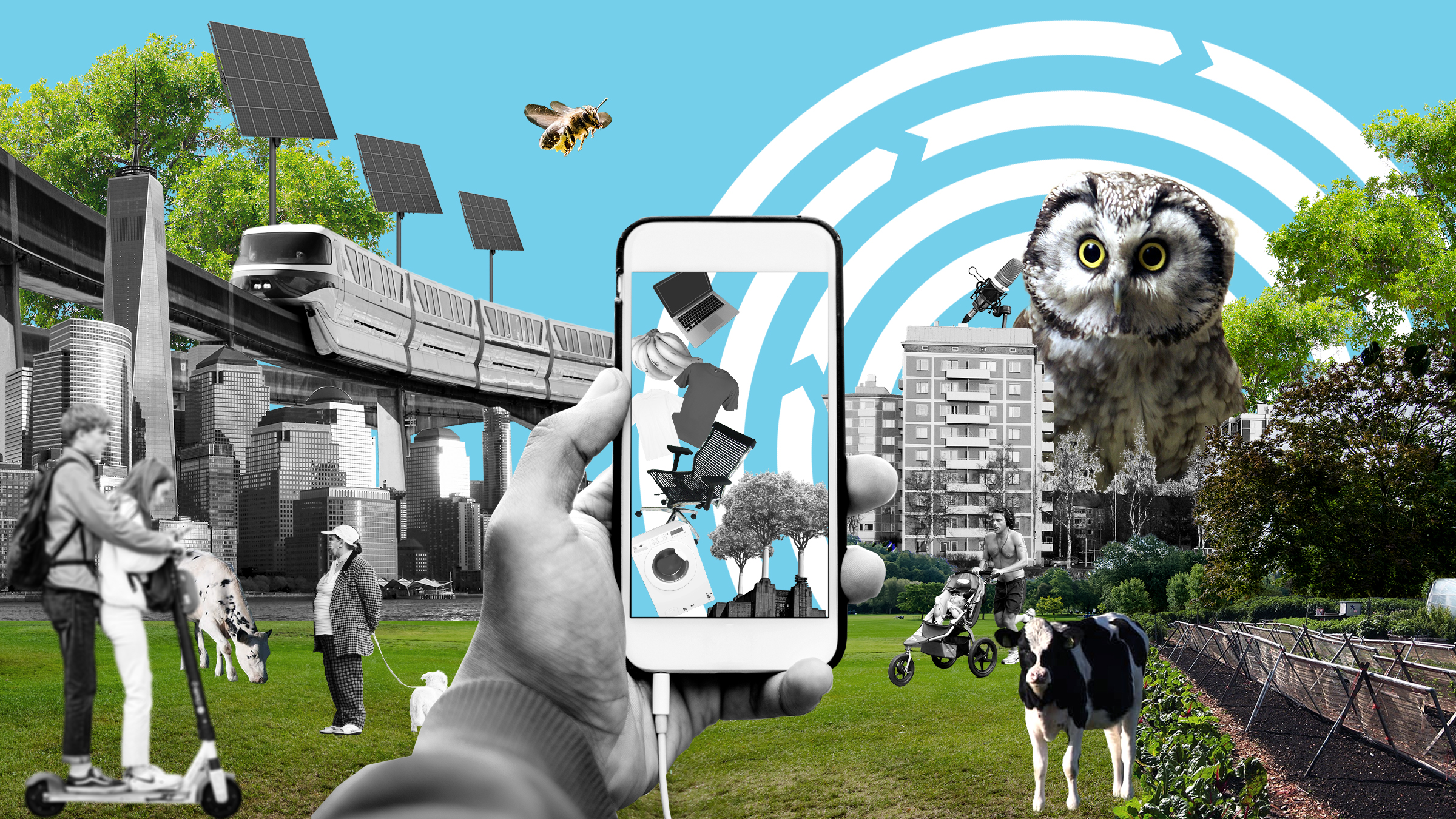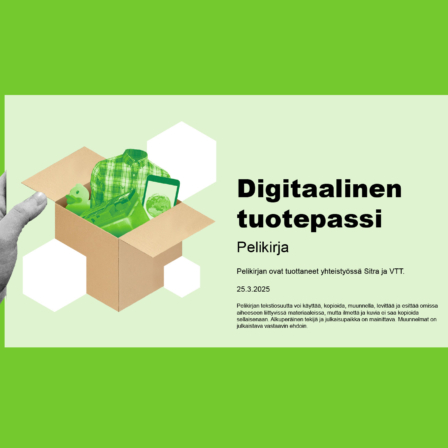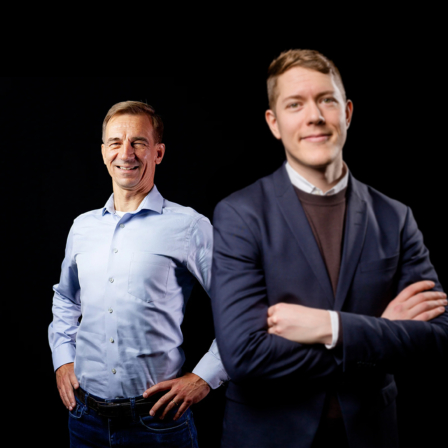Organisations and businesses need inspiration to take part in the circular transition. That is why in the lead up to the WCEFonline we set out to discover some of the most inspiring circular economy The circular economy An economic model which does not focus on producing more and more goods, but in which consumption is based on using services – sharing, renting and recycling – instead of owning. Materials are not destroyed in the end, but are used to make new products over and over again. Open term page The circular economy ideas around the globe.
The result is an extensive list containing 39 inspiring circular economy solutions. With examples from six continents, these solutions range from circular fashion to magnetic ink and from upcycling solar panel waste to podcasts and games demonstrating a circular economy in practice.
Take a closer look and get to know the trailblazing companies in the circular economy.
A fully compostable and biodegradable sanitary napkin
Anandipad by AAKAR innovations is the only sanitary pad in the world that is fully compostable and biodegradable. Increased access to sanitary napkins has important social relevance for women’s inclusion in society, and the biodegradable design eliminates the huge environmental impact of commercial plastic pads. Women are also empowered through the product’s manufacturing process, which happens in villages throughout India and Sub-Saharan Africa.
Turning large infrastructure projects circular
ACCIONA offers a holistic circular solution for applying circular economy principles in large infrastructure projects, like renewable energy, transportation and construction jobs. ACCIONA also uses a communication platform to gain a solid understanding of the problems to be tackled and to identify the best available technologies to adapt.
Re-using locally excavated earth to make environmentally friendly building materials
Construction is one of the most material- and carbon-intensive industries: building construction is responsible for 40 per cent of CO2 emissions globally. BC Materials transforms excavated earth into building materials to help jumpstart a circular construction industry. Their ambition is to help the building sector lower its carbon emissions, reduce waste and create healthy and high-quality environments for working and living.
The world’s first food-as-a-service platform for sustainable nutrition globally
About a third of all produced food goes to waste before even reaching consumers. Blendhub’s food-as-a-service platform combines a portable factory unit and cloud-based software to bring product-as-a-service principles to a less explored sector: food production. Blendhub tackles the globally relevant issue of food waste by enabling smarter nutritional supply chains and local production and distribution of food.
Home appliances-as-a-service to promote reuse, repair and extended lifecycles
Traditionally, a broken washing machine is a consumer’s expensive burden. As part of BSH Hausgeräte – with leading home appliance brands such as Bosch, Siemens, Neff and Gaggenau – BlueMovement is a clear example of how large companies can take responsibility and move towards a circular economy with their product-as-a-service business model.
With BlueMovement, BSH goes beyond selling home appliances and instead offers them as a service, delivering, installing, repairing, moving, adjusting and picking up the appliances again at the end of the contract. The lifespan of appliances is extended thanks to included repair services.
Technology based “direct-to-customer” solution for the circular fashion industry
The current fashion industry supports unsustainable consumption behaviours and excessive natural resource use. BRING by JEPLAN strives to create a circular ecosystem for the fashion industry by developing recycling technology and constructing circular supply chains, with a special focus on changing consumer behaviour. Specifically, they collect old clothes from consumers, recycle them and sell the material to their partners.
Affordable bio-based solution for recycling nutrients from agriculture
Impurities and excess nutrients washing from agriculture and urban areas reduce the quality of natural waterbeds. Carbons Finland’s hybrid biofilter is a natural and highly scalable solution that prevents nutrient leakage from fields and thereby improves local water quality. At their end-of-life, the biofilters can then be reused in several applications to release the captured nutrients back to their natural cycle.
Transforming organic waste into renewable energy and soil amendment products
CCI’s technology (the BTA Process) solves two problems: the need for renewable energy and the requirement for managing organic waste in a sustainable manner. The City of Toronto uses the BTA Process to transform residential source separated organics into biogas and digestate. In North America, the transformation of waste organics into usable products can equate to 120 million tonnes of greenhouse gas emission reductions annually.
Empowering businesses to measure and improve their circular performance
Circular IQ’s CTI Tool, developed in partnership with the World Business Council for Sustainable Development (WBCSD), enables businesses to understand the impact of their product components throughout their entire lifecycle. The data-driven metrics generated through the platform help organisations develop clear targets to improve their circularity alongside their value chain partners. By democratising their platform for all members of a customers’ value chain, Circular IQ contributes to systemic circularity.
Traceability-as-a-service to enable responsible, closed-loop supply chains
The use of lithium-ion batteries is increasing as mobility becomes electric. The Circulor platform supports the development of circularity in sectors, such as lithium-ion battery manufacturing, through enhanced traceability. By letting customers trace raw materials throughout the value chain, the platform can confirm that recycled materials are used over virgin supplies, all while ensuring respect for human rights and tracking embedded carbon throughout the supply chain.
A closed-loop process to recover and reuse salts from industrial waste water
Covestro’s solution closes the loop on the salt needed in the production of plastics and other polymers, thereby taking a step towards circularity in the materials science industry. The scalable solution is applicable to a variety of industries and provides a threefold environmental benefit: saving non-renewable resources, saving water and reducing water pollution.
Redesigning everyday products to design out waste and keep materials in the circular economy
The DSM-Niaga approach unlocks circular design for everyday furnishings, such as carpets, mattresses and furniture panels. The solution is based on designing these products with the simplest combination of non-toxic materials, which makes them safe and durable but also easy to disassemble for recycling.
Waste water treatment and resource extraction as a service
Industrial water use poses diverse resource and pollution risks. EcoVolt, from the company Cambrian Innovation, addresses the issue of water scarcity and safety with the world’s first bioelectrically-enhanced waste water treatment solution, which converts waste water to renewable energy and reduces greenhouse gas emissions.
B2B matchmaking platform to find high-value reuse options for materials and products
Across industries, the lack of information and transparency hinders the reuse of businesses’ materials. Combining technology, human intelligence and powerful tools, The Excess Materials Exchange provides a cross-sectoral matchmaking platform for materials and products while insuring traceability and transparency. The platform aims to find matches with the highest environmental and socio-economic impacts.
Customised asset sharing platforms for businesses and organisations
Many companies’ materials and machines stand idle for most of their lifespans. FLOOW2 is a platform for creating online business-to-business marketplaces for asset sharing. This customisable and scalable solution enables companies from different sectors to boost the utilisation efficiency of their assets, materials, services, personnel and facilities.
Connecting food businesses and charities to capture surplus food
Annually, 60 per cent of good, edible food goes to waste in Canada. FoodRescue.ca provides a logistical solution that helps businesses connect with their local communities to save good food which would otherwise go to waste. Their simple platform fights three major crises: food waste, climate change and food security.
A circular economy podcast on how not to save the environment
The Waste Not Why Not podcast from Ghost Island Media makes circular economy ideas accessible to the general public. They look at some of the misinformed ways people try to protect the planet and what we should do instead. Targeted at listeners without any specialised circular economy education, the podcast aims to spread optimism for a circular world with stories about problem-solvers who are already building our circular future.
Managing office furniture donation, resale and recycling while achieving a 98% diversion rate
The decommissioning of office furniture prematurely ends the lifecycle of valuable resources. Green Standards helps corporations resell, recycle or donate their furniture to local organisations in need, creating a positive environmental and social impact. In the process, Green Standards demonstrates to their partners the value that the circular economy can unlock.
Solving the end-of-first-life management of technology
Green4Good, an IT asset disposal service by Compugen, helps organisations to manage the end-of-first-life IT assets and resell the used devices at competitive rates to the next user. The programme ensures product life extension, reduces the need for manufacturing new equipment and generates verified carbon credits through technology resale and refurbishment.
Business game immerses participants in a realistic experience of circular transformation
A lack of practical training makes adopting circular practices difficult. Inchainge’s The Blue Connection is a browser-based educational tool that lets users, including businesses and students, experience the opportunities and challenges of the circular economy firsthand. Inchainge partners with companies and universities to distribute their cloud-based software as widely as possible, bringing practical circular economy knowledge to people around the globe.
Disrupting packaging with plastic-free and moisture resistant food containers
Plastic barrier coatings in food packaging improve food safety but complicate recycling. Kotkamills’ solution improves the recyclability of packaging products that are irreplaceable for society yet highly problematic from an environmental perspective. The solution eases access to sustainable raw material use and helps realise the sustainability ambitions and targets of companies and consumers.
Advanced lithium-ion battery resource recovery for safer recycling and reuse
Lithium-ion batteries have traditionally been impractical to recycle, causing hazardous waste and the loss of valuable materials. Li-Cycle has developed a ground-breaking technology to create a truly circular supply chain for lithium-ion batteries in a world where increased electrification is needed to combat climate change. This solution defies the common misconceptions about the recyclability of lithium batteries by doing so in a safe, sustainable and economically viable way.
Crowdsourced recycling platform that connects all the stakeholders of the recycling process
LiveLoveRecycle makes the recycling process easier and accessible to everyone. It connects people and companies in possession of unwanted waste products with entities who can re-use these raw materials. The app has become an integral part of life in Beirut, with 20,000 people benefiting from it today.
Ink that can be magnetised for enhanced recycling
Packaging often includes elements that hinder recycling. Magnomer’s Design2Recycle solution uses magnetic ink to eliminate labels, a crucial obstacle to recycling plastic consumer packaging. The solution has already been piloted by brands like PepsiCo and American Fuji Seal.
Refurbishing old buildings into sustainable living residences with circular lifestyles
The rapid aging of Japanese society combined with the youth’s migration to city centres have created a challenging housing situation where the elderly are left behind in suburban communities. The Odakyu Electric Railway Company has provided a new model for creating a circular community out of refurbished old buildings. The solution revitalises communities through the extension of an older building’s lifecycle and by attracting working-age people from outside the region.
The world’s first neighbour-to-neighbour food sharing application
OLIO is a platform fighting to save more food from going to waste. It is a digital platform that lets users notify neighbours about extra food or ingredients, empowering communities to come together and prevent needless food waste. By reducing food waste from households, the scalable solution has a positive impact on the environment and social well-being, both on an individual and community level.
End-to-end material traceability across global supply chains supports a circular economy
The circular economy is slowed down by invisible material flows. Optel Group’s Intelligent Supply Chain platform records the digital journey of any material flow from cradle to grave – from raw materials to the consumer and beyond. This enhanced visibility is used by companies to optimise their material flows and make more informed circular decisions related to product design.
Paving the way to a circular economy on Vancouver Island
Project Zero, an initiative by the non-profit Synergy Sustainability Institute, aims to catalyse the shift to a circular economy on Vancouver Island, British Columbia. The project provides educational content and workshop material. They organise an incubator for businesses as well as roundtable discussions for policymakers and industry leaders to identify circular opportunities.
Returning textile waste to the fashion cycle
Only one per cent of global textiles are recycled, and that percentage is difficult to reuse. Circulose by Re:newcell is the world’s first industrial-scale chemical recycling process for used textiles. The solution turns used cotton and viscose textiles into biodegradable Circulose pulp that can be made into new textile fibres. Re:newcell has been developed through collaboration between groups such as fashion houses and research organisations, making it an excellent example of diverse parties coming together for circular innovation.
Waste tracking software for smart waste and recycling solutions worldwide
The linear economy is full of waste streams that contaminate ecosystems and hide valuable resources that could be recycled and reused. Rubicon enables worldwide traceability of material flows with their software-as-a-service and data analysis for waste, recycling and smart city solutions. These services are fundamental for responsible and sustainable waste management, helping businesses and communities to fully understand and track the composition, flows, scale, impacts and costs of their waste.
Sustainable and low-cost office furniture
Office furniture has a surprisingly wasteful and short lifespan in the linear economy. Rype Office is a British office furniture remanufacturing and design company committed to addressing the 300 tonnes of office furniture going to landfills every working day in the UK. Rype Office sources used furniture from clients’ existing stock and the UK’s biggest clearance companies and offers cheaper remanufactured items that have a reduced environmental footprint.
Decentralised, customisable and resilient fertiliser for farmers in the developing world
Common fertilisers in Kenya are poorly suited for local soils and can do more harm than good. Safi Organics’ solution turns the agricultural waste streams of Kenyan farmers into customised, carbon-negative fertilisers. With engineering know-how from MIT and intimate knowledge of the local environment, Safi Organics’ highly scalable solution is well-researched and excellently suited for the Sub-Saharan African region.
Harnessing industrial side streams to regenerative agricultural solutions
A tenth of the EU’s total greenhouse gas emissions comes from agriculture. Soilfood enables the circulation of materials between sectors that do not traditionally collaborate with each other, for example by recycling industrial by-products into soil improvers, fertilisers and agricultural lime. The solution uses the by-products of one sector to produce a sustainable input alternative for another, working as a middleman who creates both monetary and ecological value for each party.
Upcycled solar panels for renewable energy generation, anywhere
Almost 1 billion people globally don’t have sufficient access to electricity. At the same time solar panel waste lacks an effective recycling system. SunCrafter’s upcycled solar modules provide an agile solution for the global challenge of providing clean and affordable energy on-demand and wherever needed, whilst decreasing the amount of materials required for renewable energy production. The solution works especially well for energy-poor, remote areas and dense urban environments lacking adequate charging infrastructure for electric vehicles.
Building the foundation for the future of circular construction
Reusing construction materials is challenging and most material ends up downcycled or wasted. Sundahus provides an online platform for managing construction materials throughout their lifecycle, helping the construction sector choose, record and track materials and products that go into a building project. The company has created what has already become a new standard procedure for many actors in the construction sector.
Diverting organic waste streams from landfills
Organic waste is seldom sorted from other types of waste in North America. SusGlobal Energy Corp helps municipalities find value in the waste. The solution enables the production of both biogas and a high-quality fertiliser from organic waste streams. The scalable solution has significant environmental benefits, helping prevent harmful methane emissions from landfills while creating a renewable source of fuel and natural fertiliser.
Compressed air as-a-service for industrial facilities
Industrial facilities often have old compressed air technology which requires oil and service and breaks easily. Tamturbo offers compressed air as-a-service that is the cheapest solution on the market in terms of lifecycle costs. The technology is nearly service- and maintenance-free because it minimises wear and tear, and it has fully remote monitoring and control capability. The solution is a great example of re-designing old technology with circular economy principles to create a product for a market where innovation has slowed down.
Plastic waste recycled into school furniture and ecological roofs
Eco-composite material reduces the unsustainable use of wood and raises awareness of the plastic waste issue. The TECO² solution transforms plastic waste into eco-composite material used in classroom benches and ecological roofs. Currently operating in Burkina Faso, the solution has a highly positive environmental and social impact, addressing plastic waste, deforestation and education quality.
A platform for anyone to sell circularly designed t-shirts
The clothing industry is known for a large environmental footprint and human rights issues across its value chain. Teemill’s online platform lets charities and other organisations create their own customised webstore for circularly designed clothing. Each t-shirt is designed to be durable and recyclable. They are printed and delivered on-demand from Teemill’s UK-based factory. This helps reduce unnecessary production of “single use” clothing made under harsh working conditions with unsustainably sourced cotton.



















Recommended
Have some more.